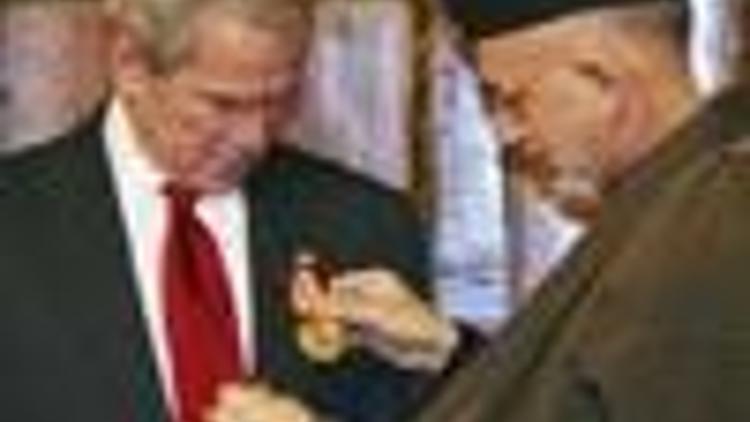Bush warns of long struggle on Afghanistan visit
Güncelleme Tarihi:

U.S. President George W. Bush warned Monday of a long struggle ahead to restore stability in Afghanistan in a surprise farewell visit seven years after he first ordered troops into the country.
Bush landed in pre-dawn darkness after an equally secretive stop in Iraq, where an angry Iraqi journalist threw two shoes at him in a potent indication of the lingering hostility toward the outgoing U.S. leader.
The presidents visit to the two countries which arguably will most define his legacy comes just over a month before he hands the keys to the White House to his successor Barack Obama on January 20.
Bush landed at Bagram Air Base near Kabul, virtually all lights on his Air Force One official plane turned off as part of a thick shroud of secrecy.
After addressing hundreds of U.S. troops at the base, he flew by Blackhawk helicopter to Kabul for talks with Afghan President Hamid Karzai.
Bush acknowledged the difficulty of restoring peace to Afghanistan where 70,000 foreign troops are fighting an insurgency which has grown increasingly violent since a U.S.-led coalition ousted the hardline Taliban regime in late 2001.
"This is going to be a long struggle," he told a joint news conference with Karzai at the presidential palace. "Ideological struggles take time."
"Are there difficult days ahead?" he asked.
"Absolutely. But are the conditions a lot better today in Afghanistan than they were in 2001? Unquestionably, undoubtedly they’re better."
This year has been the bloodiest for foreign forces here since the Taliban fell, and General David McKiernan, the top commander, has asked for more than 20,000 extra U.S. soldiers to counter rising violence.
Karzai said Afghanistan was grateful for the help, saying its people "don’t want to be a burden on the international community for ever."
Asked about a possible timetable for a withdrawal of foreign troops, Karzai indicated now was not the time to talk about pulling out.
"Afghanistan will not allow the international community leaving before we are fully on our feet, before we are strong enough to defend our country, before we are powerful enough to have a good economy," he said, joking "and before we have taken from President Bush and the next administration billions and billions of more dollars. No way!"
Bush was met at Bagram by McKiernan, and warned that the ramp-up in troop levels would inevitably lead to increased violence.
"You’ll see violence tick up," he told reporters on Air Force One en route here, drawing a comparison with the "surge" that helped bring violence down in Iraq and paved the way for some progress toward political reconciliation.
But "the degree of difficulty in Afghanistan is high," he cautioned.
"This is a significantly larger country than Iraq and significantly poorer. The infrastructure is difficult. Nevertheless, the mission is essential."
Bush laughed off the shoe incident in Baghdad, which overshadowed his fourth and final trip there since he ordered the March 2003 invasion that toppled Saddam Hussein.
Bush ducked and the first shoe hit the American and Iraqi flags behind him and Iraqi Prime Minister Nuri al-Maliki. The second was off target.
Soles of shoes are considered the ultimate insult in Arab culture. "It is the farewell kiss, you dog," the journalist shouted before he was wrestled to the ground.
As he and Maliki signed a security pact setting out new guidelines for U.S. troops in Iraq, Bush said: "The war is not over, but with the conclusion of these agreements... it is decisively on its way to being won."
Earlier, he ventured out in a motorcade through Baghdad streets, the first time he has gone somewhere other than a military base or the heavily shielded Green Zone.
Bush has staunchly defended the invasion, despite a deadly insurgency and sectarian violence that since 2003 has killed tens of thousands of Iraqis and more than 4,200 American troops.

